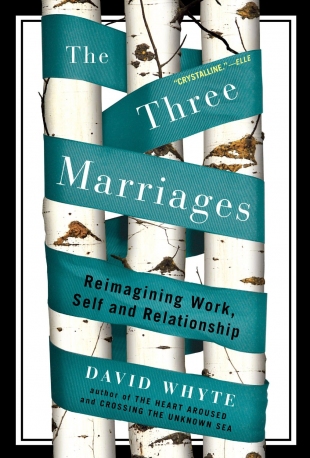David Whyte is the author of the bestselling The Heart Aroused: Poetry and the Preservation of the Soul of Corporate America and Crossing the Unknown Sea: Work as a Pilgrimage of Identity as well as seven books of poetry. An associate fellow of Said Business School at Oxford University, he lives on an island near Seattle in the Pacific Northwest. In this engaging and imaginative book, he examines the "triumphs and tragedies of human belonging in crucial areas that most individuals simply can't avoid: in relationships, in work, and in all those strange and inexplicable inner ways we belong to ourselves."
Whyte is not interested in the idea or ideal of balancing these three arenas of life. In fact, he believes that pursuit of this sort of perfection will only lead to more frustration and exhaustion than we can handle. Instead, we can take a long, hard look at each of these marriages and seek to reimagine them in all their enchanting particularity.
The first marriage — two people bound together in commitment to each other and to their mutual well-being and transformation — is challenging in every sense of the term. Whyte assesses the process of falling in love, the blending of hearts and minds, the tests which come with a long-term relationship of intimacy, and the meanings which can help us "become larger, more generous, more amusing, more animated participants in the human drama."
Whyte waxes poetic about the second marriage — work which involves a continuing conversation and an ability to change and go with the flow: "A real work, like a real person, grows and changes and surprises us, asking us constantly for recommitment." The author explores falling in love with a work; moving through difficulty, doubt, and distraction; and living with the work we've chosen. He concludes: "We know we have the right vocation and are happily married to work when we get a song in our hearts simply from doing the work itself, as much as from its rewards and its fruits."
The third marriage, which engages our soul and our senses, is to become a faithful and loving companion to our wild and wonderful self. Under this umbrella, Whyte writes about youth's first glimpse of the Self; an inner search which stretches us; being alone in the struggle and facing the world; and living with the Self (Divorce, Forgiveness and Remarriage). Throughout this journey, the author shares stories from his own life along with the adventures of Joan of Arc, Dante, Jane Austen, Robert Louis Stevenson, Charles Dickens, and Pema Chodron.
Early in The Three Marriages, Whyte quotes Alain De Botten: "We should not feel embarrassed by our difficulties, only by our failure to grow anything beautiful from them." In all three arenas of our lives, we come face-to-face with our vulnerabilities. But instead of eschewing them or running from them, we ought to establish a conversation with them: "Vulnerability is the door through which we walk into self-understanding and compassion for others." This conversation enables us to open completely to the three marriages which together offer us "a sense of profound physical participation with creation, the reconfirmation that we are not alone in the world, and the reminder that there is a larger context to existence than the one we have established ourselves."
